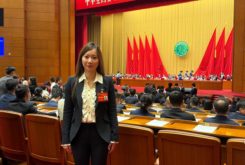More than a year after diplomatic ties were established between China and São Tomé and Príncipe, the Chinese authorities have continued their cautious stance regarding infrastructure investments in the island country, despite the government’s efforts to see some projects under way on the ground during an election year.
When the government of Patrice Trovoada broke off relations with Taiwan in December 2016, its flagship project was a large deepwater port. It was hoped that financial and technical support from major companies in the People’s Republic of China would be forthcoming.
As he explained to Macao magazine in a March 2017 interview, despite the national market’s small size the investment rationale behind such a large-scale project was trans-shipment to other countries in the very populous region, such as Nigeria, a short distance from São Tomé.
In December 2017, Trovoada forecast investment of US$200 million for work to expand the airport, plus US$800 million for the deepwater port and US$100 million to upgrade the road network.
An agreement with China was signed the following month, envisaging financing of US$148 million, below the São Tomé government’s initial estimate for the port alone, and cancellation of a US$28 million debt linked to construction of a convention centre. It also covered advice for economic planning and development, macroeconomic stabilisation and public finances.
The financing to be granted by China also considers funds to back expansion of São Tomé’s airport (around US$20 million) as well as other infrastructures.
Signed in Beijing by Trovoada and his Chinese counterpart Li Keqiang, the agreement also envisages diplomatic coordination, technical assistance at various levels and import tax exemption in the Chinese market for products originating in São Tomé and Príncipe.
It encourages the Chinese private sector to invest in tourism and especially the construction of tourist infrastructures such as hotels and other accommodations, among other infrastructures, to help increase the number of Chinese tourists visiting the country.
The cooperation process has indeed begun and some infrastructures (roads and public buildings) are being restored with Chinese support, but the flagship deepwater port project is practically ruled out due to a lack of technical and financial conditions. There are still no prospects of starting work to build a reduced version of the infrastructure.
Preliminary technical studies indicate that large ships would be able to dock if the quayside water was eight to nine metres deep (the current depth is four to six metres). They must currently anchor offshore and use barges to unload.
However, the completion or launch of similar projects by other countries in the Gulf of Guinea region have caused the external partners (China and western countries) to have reservations about the viability of the infrastructure. Due to the fact that its construction implies an exponential increase in São Tomé’s public debt.
The consulted sources indicate that the International Monetary Fund (IMF) and World Bank have set aside the possibility of financing the project, while China has expressed reservations.
The China Harbour Engineering Company (CHEC) is meanwhile building a deepwater port in Nigeria.
The deepwater port’s viability has also been questioned amid the launch, by neighbouring countries that have Panamax-type infrastructures to be completed in 2018-2019 (Kribi in Cameroon, Badagri in Nigeria and Abidjan II in Côte d’Ivoire, among others).
Trovoada recently announced the intention to replace the deepwater port with a smaller commercial port that includes a fishing wharf estimated at around US$70 million.
Local sources admit that the project’s financing comes from China. Though, in relation with São Tomé’s government, Chinese diplomatic and government officials have indicated that they are unlikely to make a respective decision in the short term.
According to CLBrief sources, Chinese diplomacy is cautiously awaiting the October elections during a period marked by heightened political, economic, and even security instability.
Local analysts also stress the existence of some mistrust between Chinese diplomacy and the government of São Tomé, ruled by the ADI party. It was during the presidency of Miguel Trovoada, father of the current leader, who was also his advisor, that diplomatic relations were cut with China in 1997 and established with Taiwan. That situation was maintained until late 2016.
China has historically been closer to the MLSTP-PSD, now the opposition party, and particularly the party’s historic leader, former president Manuel Pinto da Costa.
When Pinto da Costa was president in late 2013 he directed the foreign minister, Natália Umbelina of the government then led by Gabriel Costa, to sign an agreement to restore ties with China via the Manuel Pinto da Costa Foundation.
The expectations of Prime Minister Patrice Trovoada and his immediate entourage of boosting the economy and thereby benefiting the government’s image before the 2018 elections, due to access to financing to launch infrastructure projects through cooperation agreements with China, have been frustrated by demands for austerity measures made by the main international partners, particularly the IMF.
Despite economic growth, the government was forced to adopt austerity measures in 2017 after facing budget deficit slippage and a debt level approaching 100 percent of GDP.
The government is now seeking to access Forum Macao funds on the order of US$100 million and has named a young official from the Finance Ministry, Gualter Vera Cruz, as its representative in the Forum.



